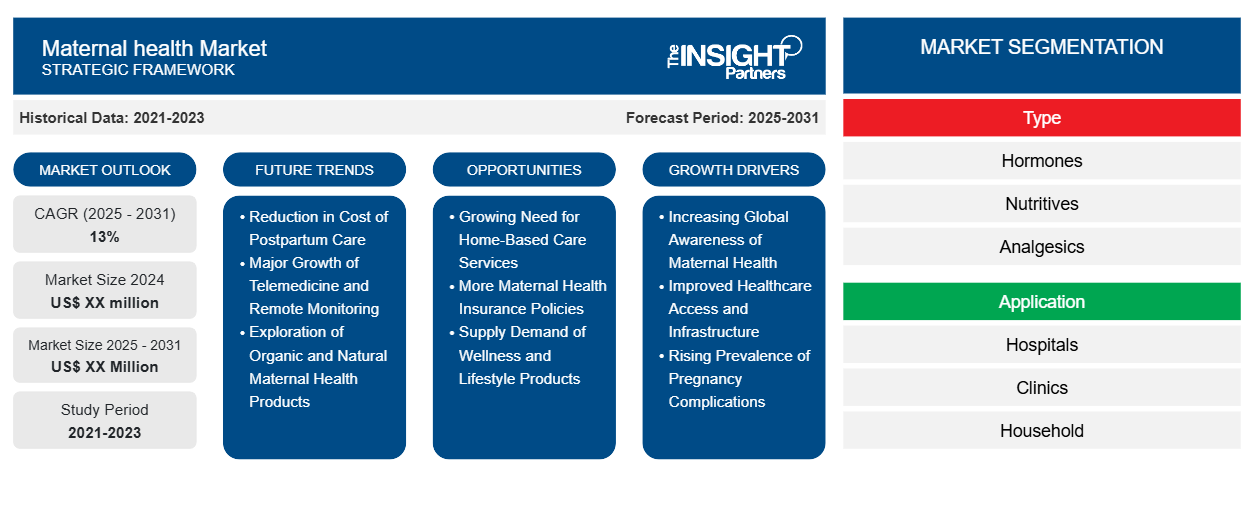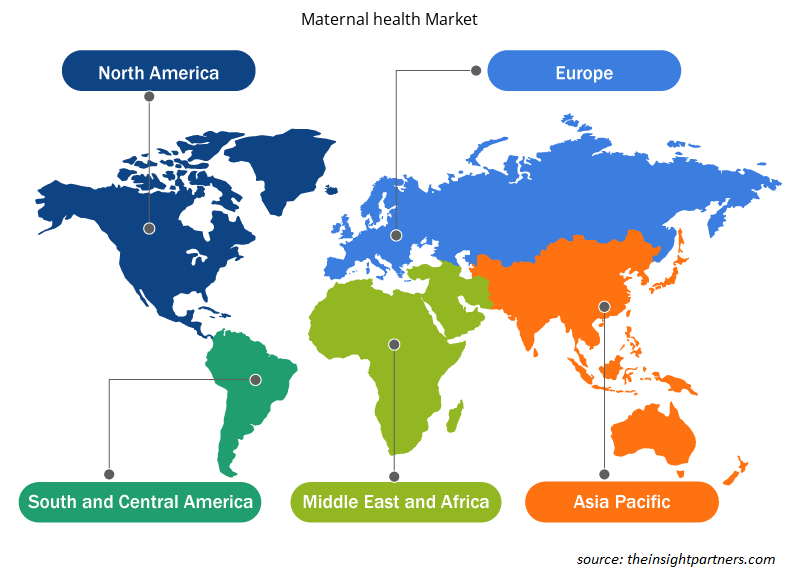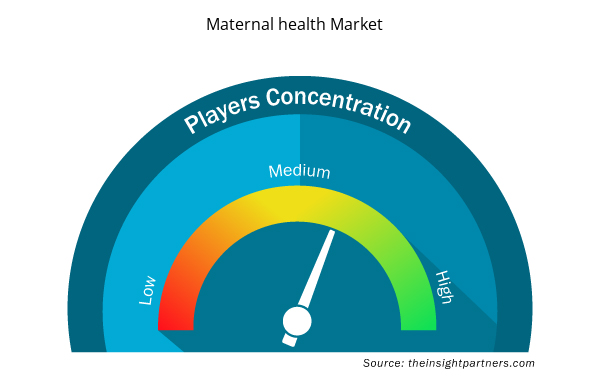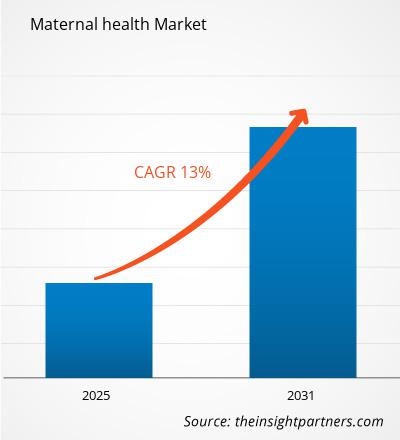The Maternal health Market is expected to register a CAGR of 13% from 2025 to 2031, with a market size expanding from US$ XX million in 2024 to US$ XX Million by 2031.
The report is segmented by Type (Hormones, Nutritives, Analgesics, Anti-Infectives, Others); and Application (Hospitals, Clinics, Household). The global analysis is broken down at the regional level and for major countries. The market evaluation is presented in US$ for the above segmental analysis.
Purpose of the Report
The report Maternal health Market by The Insight Partners aims to describe the present landscape and future growth, top driving factors, challenges, and opportunities. This will provide insights to various business stakeholders, such as:
- Technology Providers/Manufacturers: To understand the evolving market dynamics and know the potential growth opportunities, enabling them to make informed strategic decisions.
- Investors: To conduct a comprehensive trend analysis regarding the market growth rate, market financial projections, and opportunities that exist across the value chain.
- Regulatory bodies: To regulate policies and police activities in the market with the aim of minimizing abuse, preserving investor trust and confidence, and upholding the integrity and stability of the market.
Maternal health Market Segmentation
Type
- Hormones
- Nutritives
- Analgesics
- Anti-Infectives
Application
- Hospitals
- Clinics
- Household
Customize This Report To Suit Your Requirement
You will get customization on any report - free of charge - including parts of this report, or country-level analysis, Excel Data pack, as well as avail great offers and discounts for start-ups & universities
Maternal health Market: Strategic Insights

- Get Top Key Market Trends of this report.This FREE sample will include data analysis, ranging from market trends to estimates and forecasts.
Maternal health Market Growth Drivers
- Increasing Global Awareness of Maternal Health: Global maternal health awareness is one of the main market growth drivers in the Maternal Health market. Global health institutions and governments have been making a huge effort in the past 10 years to tackle the problem of maternal health, especially in low-income and developing countries. The WHO has been working hard to push for improved maternal care, maternal mortality reduction, and prenatal care services. Hence, the focus is on informing pregnant women about regular prenatal appointments, nutrition, and maternal healthcare interventions. Public education on family planning, safe birth, and care after childbirth has encouraged women to give their health a lot of attention in the course of pregnancy and to get their medical care as soon as possible. Because of this increased awareness, there is an increase in the demand for maternal health products and services such as prenatal vitamins, ultrasounds, maternity care products, and healthcare services. Increasing attention towards preventative care and education campaigns for doctors and pregnant women is also helping the Maternal Health market to grow steadily. As more women avail better maternal healthcare, the market will only grow and benefit both moms and infants.
- Improved Healthcare Access and Infrastructure: Scaling up healthcare infrastructure, especially in developing countries is another major contributor to the expansion of the Maternal Health market. There are several countries (Africa and Asia-Pacific) that have also made substantial contributions to healthcare access through easier maternity services, hospitals, and clinics. This is because of government and international funding for maternal health programs that aim to decrease maternal mortality. High-quality birth attendants, cutting-edge diagnostic equipment, and healthcare training made the maternal healthcare system more effective in some parts of the world. As have telemedicine and mobile health apps that have enabled remote prenatal care and medical consultations for pregnant women living in rural or underserved regions. As healthcare systems become better available, accessible, and affordable, maternal health goods and services will also become more needed. As the private healthcare sector grows in emerging economies, safe childbirth, prenata,l, and postnatal care services are also rising. These are some of the things that are likely to propel the Maternal Health market shortly and would contribute to maternal and child health in the entire world.
- Rising Prevalence of Pregnancy Complications: Rising rates of pregnancy issues such as gestational diabetes, pre-eclampsia, and pregnancy-related hypertension are driving the Maternal Health market too. The more women suffering from ill health while pregnant, the greater the need for maternal health care products and services. The more common chronic diseases such as diabetes and obesity in the general population, the greater the likelihood of pregnancy complications. It is also the fact that older age at birth (when women are having children later in life) is making pregnancy complications more likely. This means more monitoring equipment, drugs, prenatal exams, and other special care to address these problems appropriately. Increasing attention to high-risk pregnancies has created the need for maternal products designed for women who need extra surveillance or interventions during pregnancy. This is a need that hospitals and providers are expanding maternal healthcare services for, and the market for diagnostics, screening tools, and healthcare support systems is growing. As maternal complications increase, demand for preventive health products and services to address such complications and to facilitate safe pregnancies is expected to increase in the Maternal Health market.
Maternal health Market Future Trends
- Reduction in Cost of Postpartum Care: The increase in focus towards postpartum care is one of the trends that is driving the future of the Maternal Health market. Maternal health traditionally has been all about prenatal and childbirth, but recent evidence has confirmed that proper care after birth is as important for a woman’s well-being. Postpartum is a time of physical and emotional transitions, and complications like postpartum depression, postpartum hemorrhage, and breastfeeding challenges are all becoming the focus of healthcare systems around the world. This means that demand for postpartum healthcare products such as mental health services, lactation support,t and bodycare goods is rising. Postpartum care programs such as home visits by healthcare providers, peer support groups, and customized wellness programs are likely to increase as more emphasis is paid to the healing of the newborn. In addition, innovative products like postpartum recovery kits, incontinence products, and mental health products are also driving this market. This transformation of the postpartum phase towards a total care approach will change the Maternal Health landscape and create new opportunities over the next several years.
- Major Growth of Telemedicine and Remote Monitoring: The growing trend of telemedicine and remote monitoring for maternal health is going to be a prominent future trend. Telemedicine became commonplace in the COVID-19 pandemic and its use for prenatal care and postpartum care is finally being seen in full swing. Remote consultations, remote diagnostic tests, and health monitoring equipment allow expectant mothers (especially rural or disadvantaged women) to get excellent care without making the trip far. Remote fetal heart rate monitoring, blood pressure monitoring,g, and digital health recorders are all devices that enable physicians to keep close track of mothers’ and infants’ health throughout the life course. Maternal health apps now also help pregnant women access individualized care plans, monitor symptoms, and communicate directly with doctors. As telehealth services increase, expecting moms will look to virtual care for convenience and affordability. When telemedicine is integrated into the existing mainstream maternal health service, women will receive greater access to care, which leads to better maternal health and lower healthcare costs. This is especially welcome in places where healthcare infrastructure is lacking and more women can have basic maternal care via remote visits.
- Exploration of Organic and Natural Maternal Health Products: Consumers’ health and wellness is becoming more important than ever before, and organic and natural maternal health products have become a necessity. Whether it’s prenatal vitamins baby skin care, or organic baby products, expecting moms are on the lookout for natural ingredients with no harmful chemicals and preservatives. More and more women are turning to plant-based, chemical-free products, especially in places where mother’s and baby’s health is at stake. Organic and natural maternal care products speak to wellness consumers who worry about the effects of chemicals on their bodies and their babies. More sustainable and ecologically minded products have entered the Maternal Health market, for example, natural pre-gnancy makeup, pregnancy herbal teas, organic nutrition supplements, etc. This increasing demand is driving product development and the portfolio of products for companies in the maternal health industry. As women increasingly prefer products that meet their wellness needs, the need for natural and organic maternal health care is projected to continue to dominate the market’s growth rate.
Maternal health Market Opportunities
- Growing Need for Home-Based Care Services: A booming segment in Maternal Health is the demand for home-based care services to expectant mothers and newborn babies. With healthcare systems changing to meet the needs of today, women want to be treated at home – especially after birth. It is due to costs, care-oriented, and convenience reasons that home care is shifting. Postpartum care, lactation services, mental health home care, and so forth are specialized forms of care that may mitigate the pressures of hospital stays and speed up the process for new mothers. Moreover, as healthcare facilities become better throughout the world, telemedicine and remote monitoring services are also rising in maternal care. They are the technologies that enable physicians to remotely observe women and infants so that appropriate treatment can be rendered when needed. Virtual consultations, virtual medical check-ups, and monitors of vital signs are all on the rise to make access to maternal healthcare for rural or underserved women. This will only get stronger as healthcare systems turn towards maternal care and postpartum recovery, leading to the growth of the Maternal Health market.
- More Maternal Health Insurance Policies: More maternal health insurance policies are a growth driver for the Maternal Health industry. Maternity care services are increasingly provided by healthcare in most parts of the world, which means pregnant and giving birth don’t have to break women’s bank accounts. Governments — at least in the developed world — are implementing changes to reduce the cost of maternal care. These reforms are opening access to quality services like prenatal care, delivery services, and postpartum care, which can make huge impacts on mothers’ and babies’ health. Moreover, the increase in private health insurance coverage of maternity services such as high-risk pregnancy management, fetal surveillance, and mental health care providers, is creating new revenue sources for the external Health sector. Because more insurers are now offering packages that include complete maternity care, there will be greater demand for high-quality maternal healthcare care and thus more opportunities for physicians, medical device companies, and pharmaceutical firms to market their services. It is even more so in emerging markets, where health insurance coverage is increasing, and maternal care is available to more people. As insurance coverage expands, it is likely to benefit health outcomes and the Maternal Health market growth.
- Supply Demand of Wellness and Lifestyle Products: The other lucrative segment in the Maternal Health space is the rising interest in wellness and lifestyle products for pregnant women. Women are increasingly taking a more whole-person, medicalized view of pregnancy and birth: from nutrition to physical and emotional health. Prenatal vitamins, organic skincare products, pregnancy-safe makeup, and pregnancy fitness programs are also making a surge. Then there are wellness retreats, prenatal yoga classes, and mental health programs for more expecting mothers who want to reduce stress and enhance their preconception well-being. Organic and natural are growing fast, as women are searching for chemicals and synthetic additives-free products. That’s a trend that’s driving the demand for organic pregnancy products, including herbal teas, essential oils, and plant-based supplements. Further, as women are demanding more self-care and healthy lifestyle options, wellness products and services offered by companies in the Maternal Health industry can fulfill this requirement. Market players will have opportunities to expand their portfolio and offer products to cater to this growing segment of health-conscious consumers as the health-conscious population continues to increase.
Maternal health Market Regional Insights
The regional trends and factors influencing the Maternal health Market throughout the forecast period have been thoroughly explained by the analysts at Insight Partners. This section also discusses Maternal health Market segments and geography across North America, Europe, Asia Pacific, Middle East and Africa, and South and Central America.

- Get the Regional Specific Data for Maternal health Market
Maternal health Market Report Scope
| Report Attribute | Details |
|---|---|
| Market size in 2024 | US$ XX million |
| Market Size by 2031 | US$ XX Million |
| Global CAGR (2025 - 2031) | 13% |
| Historical Data | 2021-2023 |
| Forecast period | 2025-2031 |
| Segments Covered |
By Type
|
| Regions and Countries Covered | North America
|
| Market leaders and key company profiles |
Maternal health Market Players Density: Understanding Its Impact on Business Dynamics
The Maternal health Market market is growing rapidly, driven by increasing end-user demand due to factors such as evolving consumer preferences, technological advancements, and greater awareness of the product's benefits. As demand rises, businesses are expanding their offerings, innovating to meet consumer needs, and capitalizing on emerging trends, which further fuels market growth.
Market players density refers to the distribution of firms or companies operating within a particular market or industry. It indicates how many competitors (market players) are present in a given market space relative to its size or total market value.
Major Companies operating in the Maternal health Market are:
- Agile Therapeutics
- Fuji Latex Co.
- Johnson & Johnson
- McKinsey & Company
- MedTech Boston
- Merck Sharp & Dohme Corp.
Disclaimer: The companies listed above are not ranked in any particular order.

- Get the Maternal health Market top key players overview
Key Selling Points
- Comprehensive Coverage: The report comprehensively covers the analysis of products, services, types, and end users of the Maternal health Market, providing a holistic landscape.
- Expert Analysis: The report is compiled based on the in-depth understanding of industry experts and analysts.
- Up-to-date Information: The report assures business relevance due to its coverage of recent information and data trends.
- Customization Options: This report can be customized to cater to specific client requirements and suit the business strategies aptly.
The research report on the Maternal health Market can, therefore, help spearhead the trail of decoding and understanding the industry scenario and growth prospects. Although there can be a few valid concerns, the overall benefits of this report tend to outweigh the disadvantages.
- Historical Analysis (2 Years), Base Year, Forecast (7 Years) with CAGR
- PEST and SWOT Analysis
- Market Size Value / Volume - Global, Regional, Country
- Industry and Competitive Landscape
- Excel Dataset



Report Coverage
Revenue forecast, Company Analysis, Industry landscape, Growth factors, and Trends

Segment Covered
This text is related
to segments covered.

Regional Scope
North America, Europe, Asia Pacific, Middle East & Africa, South & Central America

Country Scope
This text is related
to country scope.
Frequently Asked Questions
The Maternal health Market is estimated to witness a CAGR of 13% from 2025 to 2031.
The major factors driving the Maternal health Market are Increasing Global Awareness of Maternal Health, Improved Healthcare Access and Infrastructure, and Rising Prevalence of Pregnancy Complications.
Future trends in the Maternal health Market are Increased Focus on Postpartum Care, Expansion of Telemedicine and Remote Monitoring, and Growth of Organic and Natural Maternal Health Products.
Some of the players operating in the market are Agile Therapeutics, Fuji Latex Co., Johnson & Johnson, McKinsey & Company, MedTech Boston, Merck Sharp & Dohme Corp., Okamoto Industries, RAND Corporation, Reckitt Benckiser Group Plc., Sanofi
The report can be delivered in PDF/PPT format; we can also share an excel datasheet based on the request.
Some customization options available based on the request are an additional 3–5 company profiles and a country-specific analysis of 3–5 countries of your choice. Customizations are to be requested/discussed before making final order confirmation# as our team would review the same and check the feasibility.
Trends and growth analysis reports related to Life Sciences : READ MORE..
1. Agile Therapeutics
2. Fuji Latex Co.
3. Johnson & Johnson
4. McKinsey & Company
5. MedTech Boston
6. Merck Sharp & Dohme Corp.
7. Okamoto Industries
8. RAND Corporation
9. Reckitt Benckiser Group Plc.
10. Sanofi

 Get Free Sample For
Get Free Sample For